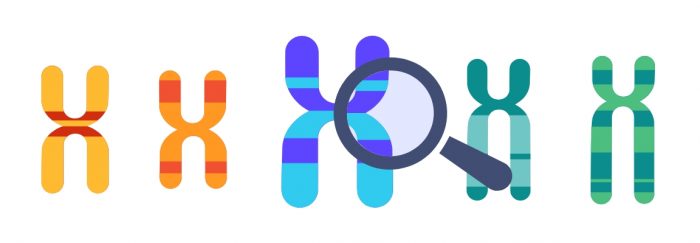The Y chromosome is one of the sex chromosomes present in male mammalian animals. In humans and other mammals, the sex chromosomes are the X and the Y. Females are characterized by having two X chromosomes (XX) and males by having one X and one Y chromosome (XY). The Y chromosome is the sex-determining chromosome.
To know the sex of a fetus, a DNA test can be done to determine whether the Y chromosome is present or not. If there is a Y chromosome present, there is no doubt that it will be male. In twin deliveries, the sex of each fetus cannot be determined in a genetic analysis, but if the Y chromosome is not present, it can be affirmed that both fetuses will be female.

The Y chromosome arises from the X chromosome. The loss of one of the segments of the X chromosome gave rise to the Y chromosome. For this reason, the size of the Y chromosomes is smaller than that of the X chromosomes.
This smaller size explains why the Y chromosome has less genetic information than the rest of the chromosomes.
The fact that the Y chromosome is only present in male individuals explains why some diseases can only be developed by males. Sex-linked inheritance refers to diseases that are transmitted from parents to offspring via one of the X or Y chromosomes.
When a male has a Y-linked disease, all male offspring will have the disease. Y-linked diseases are very rare because of the small amount of genetic information it contains.
However, if the disease is X-linked the outcome is different.
A distinction can be made between dominant and recessive inheritance. If it is dominant, a single X chromosome is sufficient for the disease to develop. In contrast, if the inheritance is recessive, two affected X chromosomes are needed for the disease to occur in females, but in males the disease develops because they have only one X chromosome.
As a consequence, the female is less likely to inherit the two affected X chromosomes and the male is more likely to inherit the affected X chromosome. For this reason, there are diseases that occur mostly in males: color blindness, hemophilia, Duchenne muscular dystrophy, Becker syndrome, etc.
If a couple has doubts as to whether either of them is a carrier of a disease, whether it is sex-linked or not, it is important to have a genetic test for each of them. In this way, it is possible to know if there is presence or absence of diseases with recessive inheritance. In the event that the man and the woman have the presence of a recessive disease, it is necessary to seek genetic counseling in order to receive the appropriate advice on assisted reproduction techniques.
I want to have a genetic compatibility test with my partner. What can I do?
If you are planning to take a DNA test in the company of another person, such as your partner, family member, friend…, tellmeGen’s Duo DNA Kit is the best choice.
You will know your genetic predisposition to develop diseases, if you are carriers of monogenic diseases (essential to know what can happen to your offspring), what personal traits and particularities related to wellness you possess, your genetic compatibility with drugs (pharmacology) and an ancestry DNA test to discover your origins.



